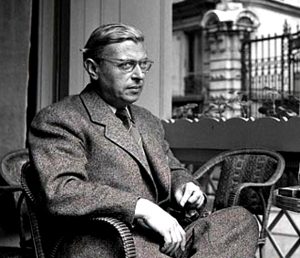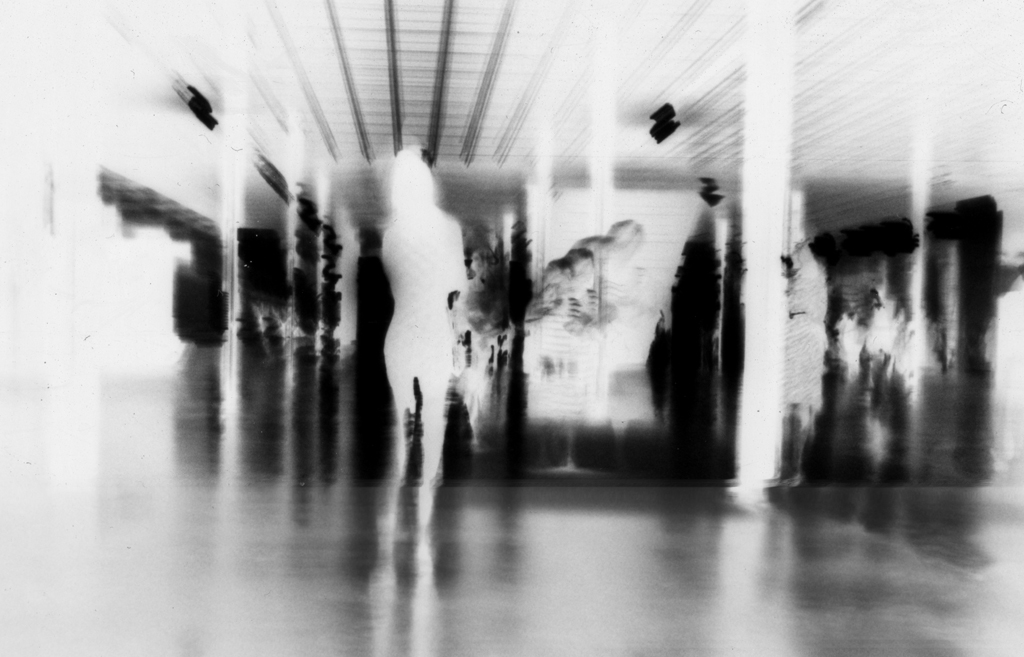The following is the first of a two-part series.
In his preface to Deleuze and Guattari’s Anti-Oedipus, Michel Foucault asks the authors’ forgiveness for describing their book as the first book of ethics written in France in a long time. As the chair of philosophy at the newly founded Centre Expérimental de Vincennes (University of Paris VIII), which had been founded in the wake of the 1968 student protests, Foucault had helped secure a position for his friend Gilles Deleuze and Deleuze’s soon-to-be writing collaborator, Felix Guattari.
The open admissions school prided itself on social critique and many members of the philosophy department had Maoist leanings. François Dosse writes that “although Foucault created the department, the idea had come from Jacques Derrida.”[1] An interdisciplinary institution, Vincennes was also the historic prison for the Marquis de Sade in the 1780s, and so had a history of dealing with madness not to be lost on its chair of philosophy. Dosse writes that the university “incarnated the triumph of structuralism, the end of a long battle that had fulfilled an impossible dream: a literary university reconciled with science where structural thinking played a major role.”[2]
This essay argues that in order to fully understand both Deleuze and Guattari’s and Foucault’s description of Anti-Oedipus as “ethical,” it is necessary to read Deleuze and Guattari’s book in light of the mission of the Centre Expérimental de Vincennes and French intellectual reactions against bourgeois politics, academics, and art. I read Deleuze and Guattari’s uprooting of the psychoanalytic and structural linguistic projects, which they call schizoanalysis, as a deep critique of a European social imaginary in which the unconscious is mind-manifested into a more than one-dimensional space.
In particular, I focus on Deleuze and Guattari’s concept of the unconscious in relation to Roland Barthes’s semiology. This information is often lost on American readers who perceive the French intellectuals of the 1960s and 1970s as a kind of legendary canon while missing the point that what made them revolutionary is ironically what is non-existent in American academia.
To begin with, structuralism in France became fashionable in intellectual circles in France in the post World War II years, following the reception of Martin Heidegger among Jean Paul Sartre & Company. In the early 1950s, Roland Barthes emerged as a voice distinct from “existentialism.” Although linked to Ferdinand de Saussure earlier in the century, structuralism in postwar France came to exist as a certain kind of writing that performed critique. The discussion became especially enmeshed in concepts of the literary. Because of this, it is helpful to understand that as Barthes was studying philology in the 1940s (poor health kept him out of the war), he also came to react against Jean Paul Sartre’s brand of existentialism and particularly a short book called Literature and Existentialism, which contains a chapter called “Why Write?” Here are some key passages from Sartre:
One can imagine a good novel being written by an American Negro even if hatred of the whites were spread all over it, because it is the freedom of his race that he demands through this hatred. And, as he invites me to assume the attitude of generosity, the moment I feel myself a pure freedom I cannot bear to identify myself with a race of oppressors. Thus, I require of all freedoms that they demand the liberation of colored people against the white race and against myself insofar as I am a part of it, but nobody can suppose for a moment that it is possible to write a good novel in praise of anti-Semitism. For, the moment I feel that my freedom is indissolubly linked with that of all other men, it can not be demanded of me that I use it to approve the enslavement of a part of these men.
Hence, any attempt to enslave his readers threatens him in his very art. (64) […]
One does not write for slaves. The art of prose is bound up with the only regime in which prose has meaning, democracy. When one is threatened, the other is too. And it is not enough to defend them with the pen. A day comes when the pen is forced to stop, and the writer must then take up arms. Thus, however you might have come to it, whatever the opinions you might have professed, literature throws you into battle. Writing is a certain way of wanting freedom; once you have begun, you are engaged, willy-nilly. (65)
In these passages we see the postwar bravado on the left as siding with anti-fascist politics and decolonization. Sartre identified writing as a way of wanting freedom and the expectation was that there was a way to achieve it. This feeling would be highly qualified by the time Deleuze and Guattari would be writing.
In addition to Sartre’s emphasis on freedom, structuralism in France was combined with a rehabilitated

notion of Marxist critique (the “humanist” Marx) after his early 1840s work became available in the 1930s, and the dissemination of interest in Ferdinand de Saussure’s Course in General Linguistics. These trends precipitated a break with Sartrean “existentialism.” Initially enamored, Roland Barthes broke with Sartre early on, publishing Writing Degree Zero in 1953 to critical acclaim. According to François Dosse:
Barthes adhered to the Sartrean theme of freedom conquered through the act of writing, but he innovated, no longer situating the commitment represented by writing in the content but rather in the form. Language became a finality identified with reconquered freedom. Literature, however, was at a zero point to be reconquered. It had degenerated through its dissolution in a daily language made up of habits and prescriptions, and through stylistics, which leads to an autarkic mode, to an ideology in which the author acts as if he were cut off from society and reduced to a splendid isolation.[3]
That needs to be kept in mind as part of the impetus for Barthes as he turned to linguistics and semiology. The entire critique of the “zero degree” in writing was like pressing a reset button for what was determined as “literature” over and against the perceived bourgeois values that had persisted in France before the war. Writing (ecrits) signaled a register of literary production divorced from bourgeois values.
A “new” literature, signaled by the nouveau roman, had to be generated to accomplish the postwar political shift in language with a focus on objects as opposed to plot, action, ideas, and character. This writing needed its critical compendium, which was found in structural linguistics, which also focused on the objectivity of language and linguistic apparatuses. Barthes increasingly turned his attention toward such analyses.
In his 1964 book, Elements of Semiology, Barthes took it upon himself to describe a “new” science that Saussure had called for in his Course on General Linguistics. Saussure had written that
A language is a system of signs expressing ideas, and hence comparable to writing, the deaf-and-dumb alphabet, symbolic rites, forms of politeness, military signals, and so on. It is simply the most important of such systems. It is therefore possible to conceive of a science which studies the role of signs as part of social life. It would form a part of social psychology, and hence general psychology. We shall call it semiology (from the Greek semeion, ‘sign’).[4]
Note in particular Saussure’s linking of the new science to psychology, which was also a new science at the time he was writing. Importantly, Saussure had also written, “colonisation, which is simply one form of conquest, transports a language into new environments, and this brings changes in the language.”[5] But Roland Barthes disagreed with Saussure’s claim that semiology would precede linguistics as a science or that linguistics would be a “branch” of semiology.
Barthes claims that semiology is a branch of linguistics rather than, as Saussure suggested, a broader science of which linguistics was a branch.[6] This is partly because for Barthes:
it appears increasingly more difficult to conceive a system of images and objects whose signifieds can exist independently of language: to perceive what a substance signifies is inevitably to fall back on the individuation of a language: there is no meaning which is not designated, and the world of signifieds is none other than that of language.[7]
Barthes goes on to claim that this is difficult because, despite its nature as a branch of linguistics, semiology must study non-linguistic objects[8]:
a language does not exist perfectly except in the ‘speaking mass’; one cannot handle speech except by drawing on the language. But conversely, a language is possible only starting from speech: historically, speech phenomena always precede language phenomena (it is speech which makes language evolve), and genetically, a language is constituted in the individual through his learning from the environmental speech (one does not teach grammar and vocabulary which are, broadly speaking, the language, to babies).[9]
After this passage in Elements of Semiology, Barthes turns his emphasis to the understudied Danish linguist, Louis Hjelmslev, who famously updated Saussure’s language to indicate “expressive plane” (signifier) and “content plane” (signified). Hjelmslev’s distinction would later allow Barthes to make critical distinctions between denotation and connotation in S / Z. In Elements of Semiology, however, Barthes notes by way of Hjelmslev that schema/usage can be contrasted with langue/parole.[10]
He notes that it is not possible to identify “language” as the code and “speech” as the message.[11] In other words, the distinction between langue and parole cannot be a reservoir of content and selective uses of formalized articulations from that reservoir. In Freudian terms, parole is not merely manifest to langue’s latency. Rather, the performance of speech is the objectively identifiable artifact of language as performance and langue is accessible through the performative events structuring articulation.
What we get instead of a clean dipper into the unconscious langue soup is the conception of the “idiolect.” Barthes describes this as “‘the language inasmuch as it is spoken by a single individual’” or habits of the individual; also, however, the language of someone with aphasia or the “style” of a writer, or “the language of a linguistic community.” He then says, “the idiolect would then correspond roughly to what we have attempted to describe elsewhere under the name ‘writing.’”[12] Idiolect here would correspond roughly to the means of expressivity available to one within a given system, a system which, as Heidegger would say, simultaneously “speaks” the writer or “scriptor,” as Barthes terms it in his famous essay on “The Death of the Author.”

Because it is the system that “speaks me,” and that “system” – which is unconceivable – is not located within one individual, one is never expressively “free.” A serious inquiry into Structuralism cannot rely on the bravado and “freedom” that Sartre called for, nor the ethics implied in that bravado. More importantly, to the extent that expressivity is itself moved by a force other than my ‘self’ which simultaneously shapes that ‘self’ as a vocative entity, the spew of my words babbles a brook bigger than being. It is relatively easy to see that an idiolect becomes in Deleuze and Guattari’s terms, an assemblage of possible articulations, especially when we combine the idiolect with Deleuze’s Nietzsche and Philosophy and Difference & Repetition. But less noted is the ways their perspective relies on Barthes, and this is crucial in order to understand how Deleuze and Guattari formulate a schizoanalysis of the unconscious.
In Elements of Semiology, Barthes takes his inversion of Saussure and applies it to concrete examples of semiology in practice, each with its distinction between language and speech:
- With garments or fashion: Language = the written material about fashion in magazines while Speech becomes how people individually dress or “worn.” Also: “What is given by the fashion photograph is the semi-formalized state of the garment system.”[13]
- Food: “the menu illustrates well this relationship between the language and speech: any menu is concocted with reference to a structure (which is both national – or regional – and social); but this structure is filled differently according to the days and the users, just as linguistic ‘form’ is filled by the free variations and combinations which a speaker needs for a particular message.”[14]
- Cars: More restrictive for speech because, like most clothes now, they are ready-made.
- Furniture: Language = functionally identical pieces while Speech = variations within one piece or various pieces in a room.
- Complex Systems / Media: Cinema / television / press are hard to distinguish between language and speech.
By inverting Saussure’s distinction between semiotics as antecedent to linguistics, Barthes relegates semiology to the study of signs. Langue is also objectified to a certain extent in the examples above. When we combine this with the notion of writing “degree zero” we get a metalanguage of literature dissociated from bourgeois notions of taste, one that prioritizes poetics. We get a semiological manifestation of something like a collective unconscious materialized as the field of the literary, but the concept of the literary in Barthes distinguished itself against both literary realism that he associated with nineteenth century aesthetics and notions that mystified language and symbolist poetry, which essentialized and alienated itself. The literary was not to be confused with metaphor.
Moreover, in contrast to the Frankfurt school, who sought a critique of society through “negativity,” Barthes took “language” and materialized it in the form of “writing.” “Writing” produces language as an “object” of study for the semiotician. Like ready-made clothing and the manufactured car, the materiality of language limits and determines speech. “Metalanguage” can, to a certain extent, liberate speech from language – but this longing for liberation also seems bourgeois, which may be one of the reasons Barthes later says the “death of the author” is the “birth of the scriptor.”
In such a statement, Barthes is not nostalgic for the author, who is the conditioned subjectivity of modernity. Barthes was pushing beyond any influence of the dialectical language of Hegel as well as any naturalized or alienated sense of language. From this perspective, “meta-language” as theory, like his treatment of langue, materialized the real rather than symbolized the abstract.
This would prove especially influential for Gilles Deleuze, who in his early work on Nietzsche was already attempting a rejection of dialectical language and particularly negation. Deleuze works this out in On Nietzsche and Difference and Repetition. But one must remember Deleuze’s context. Why would a French philosopher in the early 1960s turn to Nietzsche?
In part, Deleuze was distinguishing himself from his teachers. Hegel could be read as the philosopher of the bourgeoisie during the time Deleuze was a student, and Jean Hippolyte, who had directed Deleuze’s diplôme d’études supérieurs, was the premier Hegel scholar in France. In a similar rejection to that of Barthes and literary theorists with respect to the zero degree, Nietzsche would help Deleuze bring a degree zero for philosophy. The political context in France seems to be that a philosophy had to be employed that was not subservient to the new and strong-willed fifth republic under Charles de Gaulle, nor must it recapitulate the bourgeois sentiments of the third republic.
François Cusset’s French Theory records the fact that the shift from Hegel to Nietzsche was a primary motivation for the famous 1966 conference at Johns Hopkins University entitled “The Language of Criticism and the Sciences of Man,” which gave birth to poststructuralism (Barthes attended, Deleuze was invited but could not make it and sent a letter that was read publicly by the organizers).[15]
In this context of the necessity of new governing powers in France and the conservative turn toward de Gaulle following the Algerian war in 1958, we can read a political charge to Deleuze’s Difference & Repetition. which would appear in France in 1968. Repetition would be merely reactionary, a Hegelian dialectical negation producing a synthesis that was not entirely new. True difference could not be merely a recapitulation or re-interpretation of an event; it needed to be an entirely new event. Again, I want to suggest that it is the “degree zero” as a reorganizing point that gave a particular resonance to the interest in semiotics shared by Deleuze and Barthes, who curiously echo each other repeatedly but do not cite each other outright, even while they mutually reference major thinkers in linguistics from the period.
In Difference & Repetition, Deleuze carefully navigates this terrain through his discussion of the Idea, linking the unconscious with the project of structuralism and arguing that “relations we call structures are senses from a genetic point of view.”[16] He goes on:
In short, representation and knowledge are modelled entirely upon propositions of consciousness which designate cases of solution, but those propositions themselves give a completely inaccurate notion of the instance which engenders them as cases, and which they resolve or conclude. ‘by contrast, the Idea and learning’ express that extra-propositional or sub-representative problematic instance: the presentation of the unconscious, not the representation of consciousness.[17]
In a synesthetic move, Deleuze collapses “the psychic multiplicities of imagination and phantasy, the biological multiplicities of vitality and ‘monstrosity,’ the physical multiplicities of sensibility and sign…” by asserting the sub-representative place of the Idea.[18] Thus he claims that “the unconscious may be defined either by the extra-propositional and non-actual character of Ideas in the para-sense, or by the non-empirical character of the paradoxical exercise of the faculties.”[19] He then moves to discuss the twentieth-century preoccupation with ontology and attributes a novelistic or theatrical quality to the Idea, thus subordinating the discussion of science and philosophy to literature. He notes that by doing so, we come to see how Being questions its own difference and
[h]ence, that form of writing which is nothing but the question ‘what is writing?’, or that thought which asks, ‘what does it mean to think?’. These give rise to the greatest monotonies and the greatest weaknesses of the new-found common sense in the absence of the genius of the Idea, but also to the most powerful ‘repetitions’, the most prodigious inventions in the para-sense when the Idea emerges in all its violence.[20]
The discussion then turns back toward Nietzsche and Leibniz, and particularly ‘affirmation’ in the Nietzschean sense.[21] The task becomes the affirmation of chance, an aleatoric apogee in the throw of the dice: “The most difficult thing is to make chance an object of affirmation, but it is the sense of the imperative and the questions that it launches. Ideas emanate from it just as singularities emanate from that aleatory point which every time condenses the whole of chance onto time.”[22] The violence of the Idea is in the imperative form in which it emerges. It is not something we have control over, and that is why Deleuze situates it in the unconscious.
The power of decision at the heart of problems, this creation or throw which makes us descendant from the gods, is nevertheless not our own. The gods themselves are subject to Anankē or sky-chance. The imperatives and questions with which we are infused do not emanate from the I: it is not even there to hear them. The imperatives are those of being, while every question is ontological and distributes ‘that which is’ among problems. Ontology is the dice throw, the chaosmos from which the cosmos emerges.[23]
At this point we can see that ontology, Being, the Idea, and the unconscious are ingredients for eruptions of  singularities, which Deleuze, following Barthes and Saussure puts onto a horizontal and vertical axis.[24] He takes up once again the linguistic Idea. Deleuze is concerned that linguists employing the notion of difference in Saussure’s sense of phonemic difference at times confuse difference and opposition.[25] Difference is not negative, nor is it oppositional.
singularities, which Deleuze, following Barthes and Saussure puts onto a horizontal and vertical axis.[24] He takes up once again the linguistic Idea. Deleuze is concerned that linguists employing the notion of difference in Saussure’s sense of phonemic difference at times confuse difference and opposition.[25] Difference is not negative, nor is it oppositional.
He asks of those who would conflate opposition and difference: “Is this not a way of introducing the point of view of consciousness and actual representations into what should be the transcendent exploration of the Idea of the linguistic unconscious – in other words, the highest exercise of speech in relation to the point zero of language?”[26]
The connection to the zero point here, I want to argue, is directly linked to Roland Barthes’s notion of “writing degree zero” and his refutation of Sartre’s “Why Write?”, even though Sartre was the first to name the language in Camus’ L’Etranger l’écriture blanc or “colorless writing.”[27] But we can only get at this for Deleuze refracted through Barthes’s later work in Elements of Semiology, hence my earlier gloss on it.
Roger Green, PhD, is a Lecturer in English who teaches composition and rhetoric at Metropolitan State University in Colorado. His recent professional work brings political theology into conversation with the field of aesthetics. He is the author of “Aldous Huxley, in the Aldous Huxley Annual: A Journal of Twentieth-Century Thought and Beyond (Ed. Bernfried Nugel and Jerome Meckier (vol. 14, 2014 / 2015) and several other related articles. In 2011 he received a certificate from the Cornell School of Criticism for the work he did with political theorist Victoria Kahn. He is also a performing musician and a composer.
_________________________________________________________________________
[1] François Dosse, History of Structuralism: Volume 2, The Sign Sets, 1967-Present, Minneapolis: University of Minnesota Press, 1997, 148.
[2] Ibid., 142-143.
[3] François Dosse, History of Structuralism Volume 1, Minneapolis: University of Minnesota Press, 1997: 72.
[4] Roland Barthes, Elements of Semiology, New York: Hill & Wang, 1964: 15.
[5] Ibid., 21.
[6] Ibid., 11.
[7] Ibid., 10.
[8] Ibid., 11.
[9] Ibid., 16.
[10] Ibid., 17.
[11] Ibid., 18.
[12] Ibid., 21.
[13] Ibid., 27.
[14] Ibid., 28.
[15] François Cusset, French Theory: How Foucault, Derrida, Deleuze, & co. Transformed the Intellectual Life of the United States, Minneapolis: University of Minnesota Press, 2008:29-30.
[16] Gilles Deleuze, Difference and Repetition, Trans. Paul Patton, New York: Columbia University Press, 1968: 191.
[17] Ibid., 192.
[18] Ibid., 193.
[19] Ibid., 194.
[20] Ibid., 195.
[21] Ibid., 198.
[22] Ibid.
[23] Ibid., 199.
[24] Ibid., 202.
[25] Ibid., 204.
[26] Ibid., 205.
[27] Susan Sontag, “Preface” to Roland Barthes, Writing Degree Zero, Trans. Jonathan Cape: New York, Beacon, 1953, xx.




